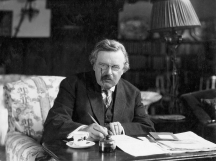
Twitter is dangerous to sincere, well-meaning people who might not be terribly savvy about social media. A few years ago (prehistory in social media terms), upmarket food store Waitrose asked people to say why they liked shopping there using #WaitroseReasons. Its PR team lived to regret it. "I shop at Waitrose because... I don't like being surrounded by poor people"; " because Clarrisa's pony just WILL NOT eat ASDA Value straw"; "because their colour scheme matches my Range Rover". It was legend.
Now there's a Twitter hashtag doing the rounds which is also a bit double-edged, in terms of publicity: #TheBibleHasTaughtMe. Some tweets are sweet: "no matter what I'm going through, I can turn my eyes to Jesus and He will always accept me with open arms"; "to be fearless"; "that God can use anybody no matter what they've done in the past".
But it wasn't long before it went a bit dark. Referring to Kentucky clerk Kim Davis' complicated marital history, PoliticalGroove said: "#TheBibleHasTaughtMe you can get married as many times as you like, as long as you're not gay." David Baddiel said: "It was a struggle but #TheBibleHasTaughtMe not to covet my neighbour's ox."
According to Mayo, "#TheBibleHasTaughtMe that people are willing to blindly believe anything without question" while Kesha Tedder says: "#TheBibleHasTaughtMe fairy tales, not facts". There's lots of that kind of thing.
Some of them are very funny: I liked Charles' "#TheBibleHasTaughtMe telling a girl that her hair is like a flock of goats leaping down the slopes of Mt. Gilead isn't a good pick-up line" and Sara Mansford's "#TheBibleHasTaughtMe that even the greatest leaders like Moses are still stubborn men who won't ask for directions". Others, not so much: Dreamweasel's tilt at the sacrifice of Isaac with "disobeying God is a greater crime than murdering your own son, for some reason".
But it's thought-provoking, for sure.
The Bible is public property. We don't own it; it's out there and if people want to mock and misrepresent it they have every right to do so. If Christians venture onto social media imagining that they're entering a safe, friendly space in which the only people to engage with them will be like-minded people who get what they're doing and wish them well, they'll very quickly find out they're mistaken. Some social media spaces are quite kind and gentle; Twitter is a bear-pit.
But an exercise like this can be very valuable in helping us see our faith as others see it and read the Bible as others read it. If we don't do that we're likely to be trapped in a small and cosy world of our own in which the hard questions never get asked. Or if they are asked, they're answered with woolly appeals to faith or a vague, "It's all a bit mysterious" or, "We'll all find out one day." Preachers who can talk about the story of Noah's Ark and not admit there's something rather problematic about the extermination of large numbers of people, or about Jephthah's sacrifice of his daughter and not say straight out that he was wrong to do it, are not doing their congregations any favours. A faith that only works if it's never challenged isn't much of a faith.
But then: the Bible is not public property. It is, we believe, a revelation from God and a gift to the Church. This means that the right place to interpret it is in the context of the life of the Church and a commitment to discipleship. In other words, we don't read it to criticise it or to pick holes in it. We read it to find out what God is saying to us through it. So our reaction when we find something that's difficult or unsavoury isn't to say, "I don't believe that" or, "That's ridiculous"; it's to say, "I don't understand that, so I need to think about it a bit harder and pray about it more."
Anselm of Canterbury, a great saint and Christian thinker, said: "I do not seek to understand in order that I may believe, but rather, I believe in order that I may understand" ("credo ut intelligam"). He didn't mean that Christians should switch off their brains, but that our approach to Scripture should start with faith rather than doubt. And if we do that, we very often find we're able to find uplifting and God-honouring things to say about even the hardest passages.
CH Spurgeon, the great 19th-century Baptist preacher, is often quoted as saying: "Defend the Bible? I would as soon defend a lion. Let it loose and it will defend itself." The actual quote is hard to track down, but he certainly used the illustration, and more than once. Spurgeon believed that positively preaching what the Bible actually says, rather than paying too much attention to its detractors, was the most effective way of evangelism. He wrote: "Let the pure gospel go forth in all its lion-like majesty, and it will soon clear its own way and ease itself of its adversaries."
#TheBibleHasTaughtMe is only a Twitter hashtag. It offers a snapshot of how the Bible's perceived, often among people who haven't thought about it that much. But Scripture really does teach us, and God really does speak to us through it.
Follow Mark Woods on Twitter: @RevMarkWoods

















